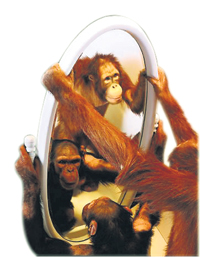|
If you can’t stop comparing yourself and your life to other people, and if you’re fanatical in wanting to be the best of everything and everyone, you have a monkey mind. How so, you ask? Smriti Daniel has more It’s a warm summer day, and Maneka is doing Priyani's hair. They’re just getting comfortable, when along comes Ameena, a mutual acquaintance. Now Ameena is as close as you can get to perfect – she has a great body, beautiful, well-behaved children and primo social status. Watching her walk by, Priyani inspects and admires Ameena’s beauty, then relaxes into the pleasant sensation of Maneka’s hands arranging her hair.
Maneka, by contrast, nearly explodes with jealousy and competitiveness. Her teeth and stomach clench, as she watches Ameena flaunt her long limbs, thick hair, and – most enviable of all – her hugely swollen, rose-red rump. Yes, Maneka, Priyani and Ameena are baboons, social primates, who share around 95 percent of our DNA (and a lot of our psychological traits). Studies have shown that some baboons (like Maneka) are extremely competitive, while others (like Priyani) are more laid-back and consequently less worried about measuring up. The more rank-conscious baboons suffer higher blood pressure – a stress-related condition that’s common amongst the more driven, competitive Homo Sapiens. Monkey mind It must be admitted at this point that comparing, measuring and contrasting are all valuable and necessary skills – and not just during high school examinations. These abilities help us make choices, and select our priorities. The matter only becomes problematic, when comparing is the only way we know of evaluating anything. Every party, every meeting, every friendship is reduced to a stressful contest. We begin making minute comparisons about everything from who has the bigger office to the smaller waist. You end up asking yourself – will I ‘win’ in this situation, or will someone else turn out to be prettier, smarter, richer, thinner… in a word, better, that I? In the famous work Desiderata, Max Erhman says, “If you compare yourself with others, you may become vain or bitter, for always there will be greater and lesser persons than yourself.” Now ain’t that the truth! On any given day, there will always be someone around, who is smarter, richer or more graceful than you are. A waste of time Constant comparison is really something you and I can live without – it’s so entirely pointless. You just gotta face it. Even if you somehow managed to be best in the world at one thing, you'll be the worst in the world at something else. It’s a given that sumo wrestlers make bad prima ballerinas; Tarzan may be the king of the jungle, but he’s just plain weird when in New York; Bill Gates would make a rotten plumber, and so on and so forth, until the end of time. If you’re into comparing yourself, and hate being less than the best at anything and everything, you’ll always lose. Always. That endless quest for acceptance, security, recognition, love and self-esteem will invariably end in self-rejection, failure, insecurity, and self-hatred. The diagnosis
The treatment Try doing a few simple things your inner baboon would never even consider. 1. Celebrate failure 2. Your greatest asset is you! We all know that a healthy sense of self-worth comes from things such as being given positive attention, being praised, being listened to and being respected. It is always good to provide these things to others. However, we must remember that our lives at work will go so much better, if we take care to give the very same things to ourselves. 3. Compliment your rivals 4. The evaluation that counts In 1841, Ralph Waldo Emerson wrote, “There
is a time in every man's education when he arrives at the conviction
that envy is ignorance; that imitation is suicide; that he must
take himself for better, for worse, as his portion.” |
||||
Copyright © 2006 Wijeya Newspapers
Ltd. All rights reserved. |
